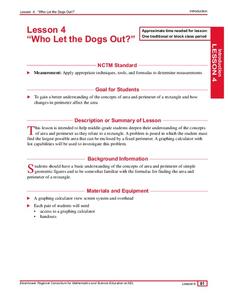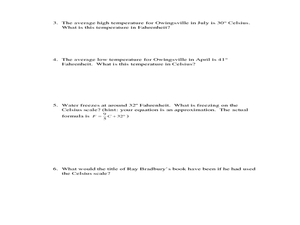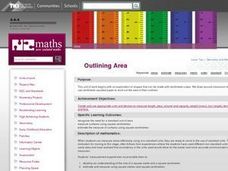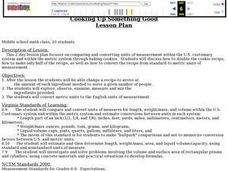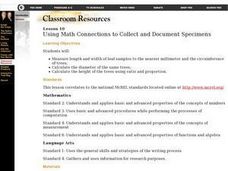Curated OER
Take Math Shopping!
Percents, estimation, and comparative analysis become more understandable when they are used in-context at the grocery store.
Curated OER
Who Let the Dogs Out?
Students examine the concepts of area and perimeter and how they relate to a rectangle. They find the largest possible area that can be enclosed by a fixed perimeter and complete a worksheet as well as create a table of all the possible...
Curated OER
What is the Percentage of Copper in "Copper" Coins?
Whether in the UK or in the US, the mass of the copper in a copper alloy penny can be determined. If you are in the US, just note that on the lab sheet, a penny is identified as a "1p piece." The penny is dissolved by young chemists in...
Curated OER
Word Problems
Here is a very nice resource that presents 12 math word problems suitable for third and fourth graders. All four of the basic operations are used in these one-step problems. An answer key is provided on page two. This would make a very...
Public Media for Northern California
An Educator’s Guide to Teaching Gun Control Issues | The Lowdown
The topic of gun control is vast, controversial, and difficult to introduce to students. This gem of a resource covers both sides of the issue and provides topic background, various multimedia and print resources, analysis questions, and...
Alabama Learning Exchange
Who Sank the Boat?
Fifth graders experiment with student-made aluminum boats to test for buoyancy. They design a boat and determine how many marbles it takes to sink it while recording their data in a spreadsheet. They design a graph using the data and...
Curated OER
The Molar Volume of a Gas
Learners find the standard molar volume of a gas. In this molar volume of a gas lesson plan, students react magnesium metal and hydrochloric acid and collect the hydrogen gas produced using a gas collection tube. Learners calculate the...
Foundation for Water & Energy Education
How is Flowing Water an Energy Source? Activity A
Here is a fun little exploration of the potential energy potential of falling water. Learners drop water from various heights using a straw, and they analyze the diameter of the splash. Pair this with two more activities of the same...
Curated OER
Energy Motion in the Ocean
Students explore the wave energy that is generated and transferred in the ocean. Through the use video and the Internet, students explore the aspects of a wave and how its energy affects the ecology of the seashore.
Curated OER
Exploration Sequence of Bounces
New skills are developed as students use graphing calculators and ranger technology to capture and graph the sequence of bounces a ball makes when dropped. After recording the height of four or more bounces, they use the collected data...
Curated OER
Celsius to Fahrenheit
Students convert degrees between two different units. In this algebra instructional activity, students graph linear equations and identify the line of best fit. They use their line of best fit to make predictions given a set of data.
Curated OER
Outlining Area
Explore measuring various objects using square centimeters. Learners create various shapes using five centimeter cubes, calculate the area in square centimeters of different classroom objects, and discover who has the largest mouth,...
Curated OER
Sand Babies
An engaging activity which has elementary learners measure weight to the nearest pound and construct and interpret a bar graph! They measure length using non-standard units and determine area using square tiles. Pupils round their birth...
Curated OER
Cooking Up Something Good
Students compare and convert units of measurement within the United States customary system and within the metric system by baking cookies. Students discuss how to double the cookie recipe, how to make only half of the recipe, and how to...
Curated OER
Are You Full of Hot Air?
Explore the concept of measuring and recording circumference. In this physical science and measurement lesson, young learners blow up balloons, measure the circumference, and record the data on an interactive graphing website.
Alabama Learning Exchange
The Water Cycle
Learners identify the stages of the water cycle. They listen to the book "Magic School Bus: Wet All Over," examine the Build Your Own Water Cycle website, predict and measure the amount of water in a jar for a week, and read a short play...
Curated OER
Math is Everywhere: Part 2
Second graders identify shapes and measurements in everyday life. In this measurement lesson, 2nd graders locate rectangles in their classroom and use standard and nonstandard forms to measure them. Students view a video clip...
Curated OER
Conversions: Metrics Made Easy
Students convert standard units of measurement to metric units using tape measures, meter sticks, rulers, and online conversion calculators.
Curated OER
Make Me Metric
Young scholars discover the need for standard units of measurement. They be engaged in estimation, problem solving, and use of measurement tools to begin an understanding of the metric system.
Curated OER
Light Plants and Dark Plants, Wet Plants and Dry Ones
Young scholars plant sunflower seeds in plastic cups, and once germinated, these are exposed to different conditions of light levels and/or soil moisture contents. Students measure growth of the seedlings every few days using...
Curated OER
Using Math Concepts to Collect and Document Specimens
Students determine the length and width of leaf samples to the nearest millimeter and the circumference of trees. They participate in a discussion about the importance of collecting specimens carefully. They compile accurate...
Curated OER
Magnitude of the Richter Scale
Students examine how a Richter scale operates. They create a booklet illustrating each rating on the scale. They discover how engineers use different measurement tools.
Curated OER
Customary Measurement Conversions
Fifth graders discover in hands-on activities the relationships between the measures. They work in groups to create conversion tables using familiar measuring tools. Students solve problems requiring conversions.
Achieve
Corn and Oats
How much land does a parcel hold? How much fertilizer does it take for a field of corn? Pupils answer these questions and more as they apply ratio reasoning and unit analysis.



